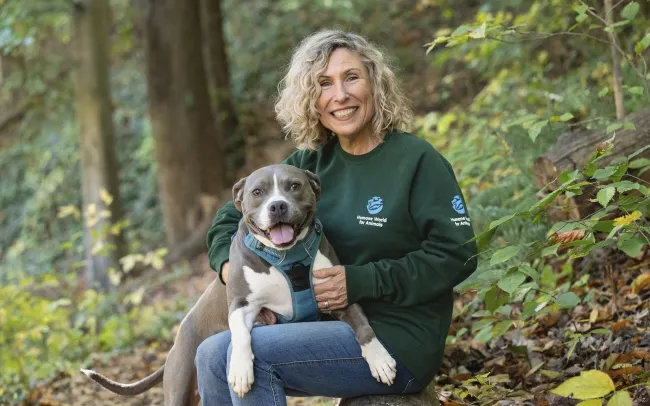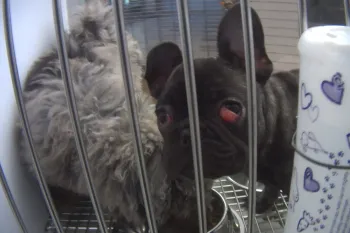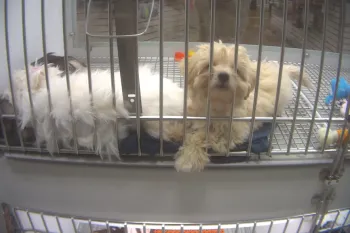We routinely hear stories from people who are devastated after purchasing sick dogs from pet stores. Because most pet store puppies are bred in negligent, inhumane and unsanitary puppy mills, many of those puppies are sick with genetic or infectious diseases. Sometimes, these diseases are transmissible to humans, resulting in both a sick puppy and sick families. This was the case with the Guerin family. A complaint submitted in the Court of Common Pleas for Franklin County, Ohio, describes their grueling experience.
According to the complaint, in early 2023, Brian Guerin purchased a mini Bernadoodle puppy from the Petland store in Grove City, Ohio. His wife, Cara, had fallen in love with the puppy on a prior visit; he wanted to surprise her.
The family was going through a particularly vulnerable time. Cara’s father had recently passed away, and his death had deeply affected everyone in the household, including their 5-year-old twins. The puppy, later named Nellie, was supposed to bring joy back into their lives. Instead, the complaint alleges, the family found themselves fighting off a terrible illness.
Shortly after arriving home, Nellie was experiencing diarrhea, which the Guerins attributed to the stress of a new home and different food. However, within days of Nellie’s arrival, one of the Guerins’ children developed severe abdominal pain and other extremely uncomfortable gastrointestinal symptoms. A trip to the veterinarian confirmed that Nellie’s symptoms were not related to stress, but were caused by Campylobacter, a severe bacterial infection transmissible to humans. Shortly after, Brian and their other child came down with similarly severe symptoms. Examinations by their doctors revealed that Brian and the two children were also positive for Campylobacter. It was weeks before the family started feeling better.
A lawsuit filed by the law firm Holland & Muirden, assisted by our attorneys here at Humane World for Animals, seeks justice for Brian and his family. Thankfully, Nellie is now a happy, healthy puppy, but as the lawsuit alleges, the Guerin family is still impacted by the trauma they experienced because Petland sold them a sick puppy.
This is not the first time Petland has been linked to puppies suffering from Campylobacter. The Centers for Disease Control and Prevention investigated an especially harmful antibiotic-resistant strain of Campylobacter, first from 2016 to 2018 and again in 2019, noting many infected people “had contact with puppies or were employees at pet stores, including Petland.” In 2021, JAMA (a journal published by the American Medical Association) warned of the “increasing public health threat” of antibiotic-resistant Campylobacter infections linked to pet store puppies, noting Campylobacter “strains have been circulating for at least 10 years and continue to cause illness among pet store customers, employees and others who encounter pet store puppies.”
In 2019, a Humane World for Animals undercover investigation of a Kentucky Petland store found that puppies with potential symptoms of Campylobacter were being offered for sale to the public without testing them for the disease, even after the CDC’s public warnings. In fact, Petland sold our undercover shopper a puppy who had been sick for weeks with gastrointestinal symptoms; when asked about the puppy’s condition, a manager stated it was “not Campylobacter.” After the purchase, the puppy tested positive for Campylobacter bacteria and Giardia, a kind of tiny parasite that also causes diarrhea. Subsequent undercover investigations of Petland have shown that other stores have the same careless attitude toward sick puppies, often improperly treating symptoms such as diarrhea or poor appetite without having puppies tested by a veterinarian to determine the cause.
We will continue to stand with families like the Guerin family. That said, the problem needs a systemic solution that gets at the root of cruelty; we cannot solve it one lawsuit at a time. The whole puppy-mill-to-pet-shop pipeline needs to be dismantled.
In Ohio alone, where this incident occurred, there are hundreds of high-volume commercial dog breeders—many with terrible animal welfare records—and dozens of puppy-selling pet stores, including 15 Petland stores. Our recently published Horrible Hundred report exposed 16 Ohio dealers for their shocking conditions, which included failing to provide dogs with basic vaccines and failure to provide limping or injured dogs with treatment. At least 25 of the breeders in this year’s Horrible Hundred have sold to Petland or to its affiliated pet stores or have been listed as Petland breeders on one of the company’s websites.
Lawmakers can do far more to protect dogs and the people who care about them. In Ohio, that starts with heeding the repeated calls of advocates, including a letter to Gov. Mike DeWine from a coalition of 20 humane societies, rescues, veterinarians and animal welfare organizations to properly enforce the state’s existing puppy mill laws. Secondly, it’s time for the Ohio General Assembly to repeal its pet store preemption law—a gift to Petland, which is headquartered in the state—that bans localities from protecting dogs and puppies in pet stores. Last week, we celebrated a heartening milestone: 500 cities and counties across the U.S. have banned the sale of puppies in pet shops, but Ohio pups and families cannot benefit from such ordinances because they are barred in Ohio as a result of that preemption law.
The Guerin family’s story should remind us of the true cost of allowing the puppy mill-to-pet shop pipeline to continue. It is the cause of so much misery and suffering for animals, one that also takes an emotional, and in some cases physical, toll on the people who only want to bring the joy of an animal into their homes.




